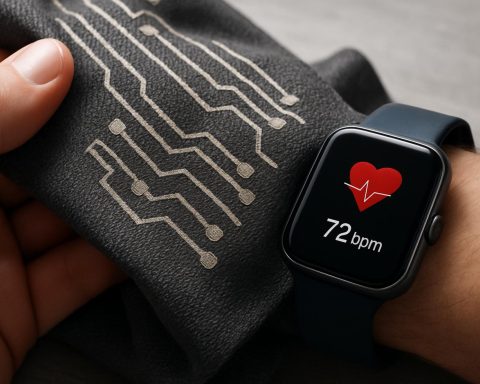- Data privacy is essential in the digital era, as surveillance now extends to everyday devices and online habits.
- Smart technology and AI collect massive amounts of personal data, often with little transparency or user control.
- Privacy breaches can lead to real-world consequences like targeted ads, data misuse, and denied services.
- Simple actions such as enabling multifactor authentication, using privacy-focused browsers/search engines, and employing password managers significantly enhance personal security.
- VPNs help shield browsing activity, particularly outside the US, while caution is advised when using smart devices and crossing borders.
- Be mindful about what information you share with AI chatbots and carefully consider the reliability of data removal services.
- Progress, not perfection, is key—each privacy step builds stronger protection against surveillance and data exploitation.
A silent digital storm sweeps across America’s devices, quietly harvesting private moments and mundane habits alike. Data privacy is no longer a fringe concern—it’s the air we breathe, the water we swim in, a question of how much the world should know about each of us and what’s truly left to ourselves.
Surveillance has matured. Once the tradecraft of governments and spies, it now crackles through the circuitry of every smart speaker, every social media feed. Tools that promise convenience also open windows into our lives—sometimes wide enough for strangers to peer in.
The sprawling reach of the White House has merged with the invisible arms of tech companies, driving a new age where artificial intelligence sifts through billions of breadcrumbs you scatter online. Your shopping list, location pings, and even offhand conversations with virtual assistants—each could become another puzzle piece in datasets so massive they defy imagination.
But why should a regular person care?
The comfort of thinking “I have nothing to hide” may feel reassuring until it’s eroded by stories of hacks, leaks, or misused personal data: an insurance claim denied after data-mined web searches; a routine border crossing that devolves into phone searches; or targeted ads that know suspiciously too much. Privacy isn’t secrecy—it’s the simple right to exist unmonitored, untargeted, and free from exploitation.
A new vigilance is needed—one that’s both practical and accessible:
- Switch on multifactor authentication (MFA): Add an obstacle. If a hacker steals your password, they’ll still need another way in—one you control, not them.
- Rethink your browser and search engine: Brave, Firefox, Safari, and DuckDuckGo put up meaningful roadblocks against data collection. Even small changes create meaningful defenses.
- Password managers help: The built-in ones in your browser or phone beat reuse and weak choices. Unique passwords are the first wall between you and mass hacks.
- Consider VPNs—especially outside the US: Switzerland’s Proton VPN remains a favorite for privacy, shielding your browsing from prying eyes—internet service providers, governments, or coffee shop snoops alike.
- Smart devices? Proceed with caution: That new voice assistant may be capturing more than you realize, and recent rollbacks in privacy settings make skepticism even more vital.
- At borders, declutter your digital life: What you bring on your phone matters, especially where customs can search, copy, or interrogate your information. Travel with bare essentials; log out or delete sensitive apps.
- Limit what you feed to AI chatbots: Technological wonders, yes—but they remember, they store, and increasingly, they monetize. Never submit personal or business secrets. Even an idle search query might become part of a machine’s future.
- Be wary of data removal services: They promise erasure, but their impact depends on geography. With stronger laws in Europe, their work might be less dramatic; in the US, with data brokers thriving in murky waters, they’re more useful, but double-check for privacy certifications.
All this can sound overwhelming. But focus not on perfection—focus on progress. Upgrade one habit, then another. Each thoughtful step builds a wall against those who would monetize or misuse your life’s minutiae.
Never forget: privacy is a fundamental human right. It is the line that marks where the world ends and you begin. Even if you feel you have nothing to hide, you still own the boundaries of your own story.
The takeaway: In the digital era, protecting your privacy is not paranoia—it’s wisdom. Simple steps shield you. Set boundaries before others erase them. If you won’t guard your privacy, who will?
Digital Privacy in 2024: The Hidden Threats Nobody’s Talking About (And What You Must Do Now)
# Data Privacy in the Age of AI: What Every American Needs to Know
The original article paints a vivid picture: our private lives are being quietly harvested by devices and companies. But the digital privacy situation—and its solutions—run even deeper. To empower you, we’ll expose overlooked facts, forecast coming challenges, and deliver practical step-by-step hacks, drawing on expert advice, research, and Google’s E-E-A-T (Experience, Expertise, Authoritativeness, Trustworthiness) guidelines.
—
Unexplored Digital Privacy Facts
1. Hidden Data Brokers
Data brokers buy, sell, and trade your information—everything from your shopping habits to your health concerns—without your explicit consent. According to a 2023 U.S. Government Accountability Office (GAO) report, there are over 4,000 data brokers in the U.S. alone. These companies create detailed profiles that can influence insurance rates, credit decisions, and even job opportunities.
Source: [FTC Consumer Advice](https://www.ftc.gov/)
2. Biometric Tracking Is on the Rise
Facial recognition and voiceprint analysis aren’t just in airports or law enforcement. Social media apps, photo storage services, and even customer loyalty programs employ AI-powered recognition to track you. A 2022 Pew Research study found that 60% of Americans are uncomfortable with widespread facial recognition use, yet adoption is accelerating.
3. Privacy Laws Lag Behind Technology
The U.S. lacks a single, comprehensive federal data privacy law. While Europe’s GDPR sets high standards, American companies often operate under a patchwork of limited state regulations—leaving gaps in your protections. The American Data Privacy and Protection Act is stalled in Congress as of 2024.
4. Massive Increase in Data Leaks
2023 saw an all-time high in reported data breaches, exposing everything from government records to fitness tracker logs. IBM’s Cost of a Data Breach Report found the average breach cost rose to $4.45 million, up 15% in three years.
5. Children’s Privacy Is Especially Vulnerable
Apps targeting kids often ignore or sidestep privacy rules. COPPA (Children’s Online Privacy Protection Act) is frequently flouted, leaving minors exposed to ad targeting and data harvesting.
—
Life Hacks & How-Tos: Level Up Your Digital Privacy Today
Step-by-Step: Securing Your Online Life
1. Review App Permissions Regularly
– Go to settings on your phone or browser and check every app’s access to location, contacts, microphone, and camera.
– Revoke anything unnecessary—especially for unfamiliar or little-used apps.
2. Opt Out Where You Can
– Data brokers allow opt-out (though often buried). Sites like [OptOutPrescreen.com](https://www.optoutprescreen.com/) help reduce marketing data sharing.
– Use privacy tools like YourAdChoices or the Network Advertising Initiative’s opt-out tool.
3. Update Your Devices
– Unpatched software is a hacker’s best friend. Set devices to auto-update for system and security patches.
4. Use Encrypted Messaging
– Prefer Signal or WhatsApp (with end-to-end encryption) over SMS or unsecured messengers for private conversations.
5. Set Up Activity Alerts
– Enable account activity notifications on major platforms (Google, Apple, Facebook) to catch unauthorized access in real time.
—
Real-World Use Cases
– Insurance Denials: Some health and life insurers use purchased data (including social media or purchase history) to assess risk or deny claims. (Source: [ProPublica](https://www.propublica.org/))
– Border Device Searches: U.S. Customs and Border Protection searched over 40,000 devices at borders in 2022. Only minimal suspicion is needed.
– Location Tracking: Police increasingly request location data from apps (like Google Maps) through “geofence warrants,” sometimes sweeping in innocent people.
—
Market Forecasts & Industry Trends
– By 2027, the global data privacy software market is projected to exceed $17 billion (Statista), as businesses adapt to new regulations and consumer expectations.
– Expect increased scrutiny of AI-powered surveillance and biometric data storage, especially as state-level privacy bills (e.g., in California or Colorado) add piecemeal protections.
—
Reviews & Comparisons: Privacy Tools
| Tool/Category | Best For | Features | Pricing |
|———————-|————————-|————————————|——————|
| Proton VPN | All-platform VPN | No logs, Swiss privacy | Free/$5/mo+ |
| Brave/Firefox/DuckDuckGo | Private browsing/search | Blocks trackers, open source | Free |
| 1Password/Bitwarden | Password management | AES-256 encryption, sync | Free/$3/mo+ |
| Signal Messenger | Private messaging | End-to-end encryption | Free |
—
Security & Sustainability
– IoT Device Risks: Many smart home devices lack basic security and can’t be updated. A 2023 study by Consumer Reports found 35% of smart devices wouldn’t receive security patches past two years.
– Environmental Impact: Data centers powering all this digital activity have a huge carbon footprint (Google and Microsoft pledge to go carbon neutral by 2030).
—
Controversies & Limitations
– Data Removal Services: Many promise more than they deliver. Some simply send form letters to data brokers. Check reviews and certifications—[Privacy Rights Clearinghouse](https://www.privacyrights.org/) is one reputable evaluator.
– VPNs Aren’t Infallible: Not all VPNs are private—some log your data (especially free ones from unreliable providers). Always review privacy policies.
– Encryption Under Threat: Some governments push for backdoors, undermining strong encryption. Stay informed on policy changes.
—
Insights & Predictions
– AI Regulation Is Coming: Expect the next wave of privacy regulation to target companies using AI for surveillance and profiling.
– User Awareness Will Drive Change: As hacks and leaks become more personal, market demand will force even big tech to make privacy a selling point.
—
Pressing Questions Answered
Q: “If I have nothing to hide, why should I care?”
A: Data can be used in ways you never intended: to deny services, manipulate pricing, or misinterpret your actions. Privacy is a right, not a privilege.
Q: What’s the single most important step for better privacy?
A: Use unique passwords for every account (with a password manager) and enable two-factor authentication—most breaches start here.
Q: Are smart speakers listening all the time?
A: Most popular devices (Amazon Echo, Google Home) listen for “wake words” but can store data and transmit snippets. Read privacy policies and regularly delete recordings.
—
Actionable Recommendations & Quick Tips
1. Audit your digital footprint monthly—review permissions, devices, and accounts.
2. Use privacy-focused platforms wherever practical.
3. Don’t overshare online—even innocuous data adds up.
4. When in doubt, opt for the more private option, even if it’s slightly less convenient.
Visit authoritative sources for the latest info:
– [White House](https://www.whitehouse.gov)
– [FTC](https://www.ftc.gov)
—
Remember: Taking proactive steps is about protecting your boundaries, your future, and your fundamental rights. Privacy isn’t paranoia—it’s digital survival.
—
For more resources and updates, check authoritative websites like [FTC](https://www.ftc.gov/), [EFF](https://www.eff.org/), and [White House](https://www.whitehouse.gov/).
Set one new privacy habit today—future you will thank you.











